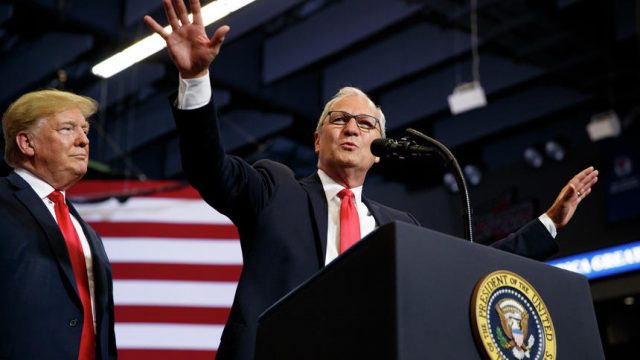Kevin Cramer: On Trade, I Stand With North Dakota’s Farmers and Ranchers

Rep. Kevin Cramer (R-N.D.) speaks at a campaign rally as President Donald Trump looks on at Scheels Arena in Fargo, N.D., June 27, 2018. (Tom Brenner/The New York Times)
This guest post was submitted by Congressman Kevin Cramer who is challenging incumbent U.S. Senator Heidi Heitkamp this election cycle.
I am pleased to announce that U.S. Secretary of Commerce Wilbur Ross and U.S. Department of Agriculture Deputy Secretary Stephen Censky will visit North Dakota on Thursday, August 23. I am confident the upcoming visit to our state from such high-level Administration officials will be a great opportunity to keep North Dakota’s interests at the forefront of trade negotiations and tariff relief development.
For decades, countries like China have taken advantage of the United States through trade deals that harm our American workers, ag producers and businesses. As a candidate, Donald Trump knew this practice had to end and he campaigned on getting better deals for our country that put the interests of America first. As President, Trump is working to fulfill this promise.
While I firmly support President Trump’s efforts to stand up to countries who have long taken advantage of us, I oppose the use of tariffs as a negotiating tool and have consistently spoken out against this tactic during my time in Congress.
Make no mistake: China, Mexico, Canada and other countries were already violating the rules and principles of free trade and harming our economy. Hit especially hard are agricultural products like corn, wheat, soybeans and potatoes. The impact of these disastrous trade deals and unfair trade practices is the loss of hundreds of billions of dollars to our economy every year.
While I support the President’s goals, I would prefer the President take a more measured approach than tariffs and will continue to urge the administration to adopt such a stance.
[mks_pullquote align=”right” width=”300″ size=”24″ bg_color=”#ffffff” txt_color=”#000000″]I believe the best way now to serve North Dakota is to offer solutions, not sound bites. That’s why, I’ve been working with the administration to help them understand the impact of these tariffs and to provide our farmers much-needed relief. [/mks_pullquote]
Unfortunately, that is not where we are today. And, as our tariffs have been implemented, China has retaliated with tariffs of their own. As we all know, the short-term is the long-term in agriculture, and just one season can ruin a farmer’s livelihood. As a result, these counter tariffs have the potential to greatly impact North Dakota’s agricultural community.
I believe the best way now to serve North Dakota is to offer solutions, not sound bites. That’s why, I’ve been working with the administration to help them understand the impact of these tariffs and to provide our farmers much-needed relief.
Since April, I have been in direct contact with President Trump, Secretary Perdue and Trade Representative Lighthizer. In June, I convened a White House meeting between a delegation of North Dakota farmers and ranchers and administration officials U.S. Secretary of Commerce Wilbur Ross and U.S. Department of Agriculture Deputy Secretary Stephen Censky. As recently as last month, I invited a top Commerce Department official to come hear from North Dakotans firsthand.
At every opportunity, I’ve urged the administration to resolve these trade disputes and use all the tools at their disposal to protect agriculture producers from any short-term disruptions. Last month, they did just that. USDA unveiled a short-term plan to protect our farmers, a plan which included key solutions I advocated for.
The USDA will use the Market Facilitation Program to offer payments to certain producers to help them handle market disruptions while expanding here at home and abroad. The USDA will also implement a Food Purchase and Distribution Program to buy certain commodities experiencing a surplus. Finally, they will administrator a program meant to help develop more export markets.
In total, this will amount to $12 billion, matching the roughly $11 billion impacted by these retaliatory measures. While I am supportive of these measures, they are also temporary; and I will urge the administration to continue to view them as such throughout this process.
North Dakotans want trade, not aid, and this package will only be effective for a short window of time. As I have done from the start, I will continue to urge for the President and his administration to bring countries like China to the table to find a permanent solution.




